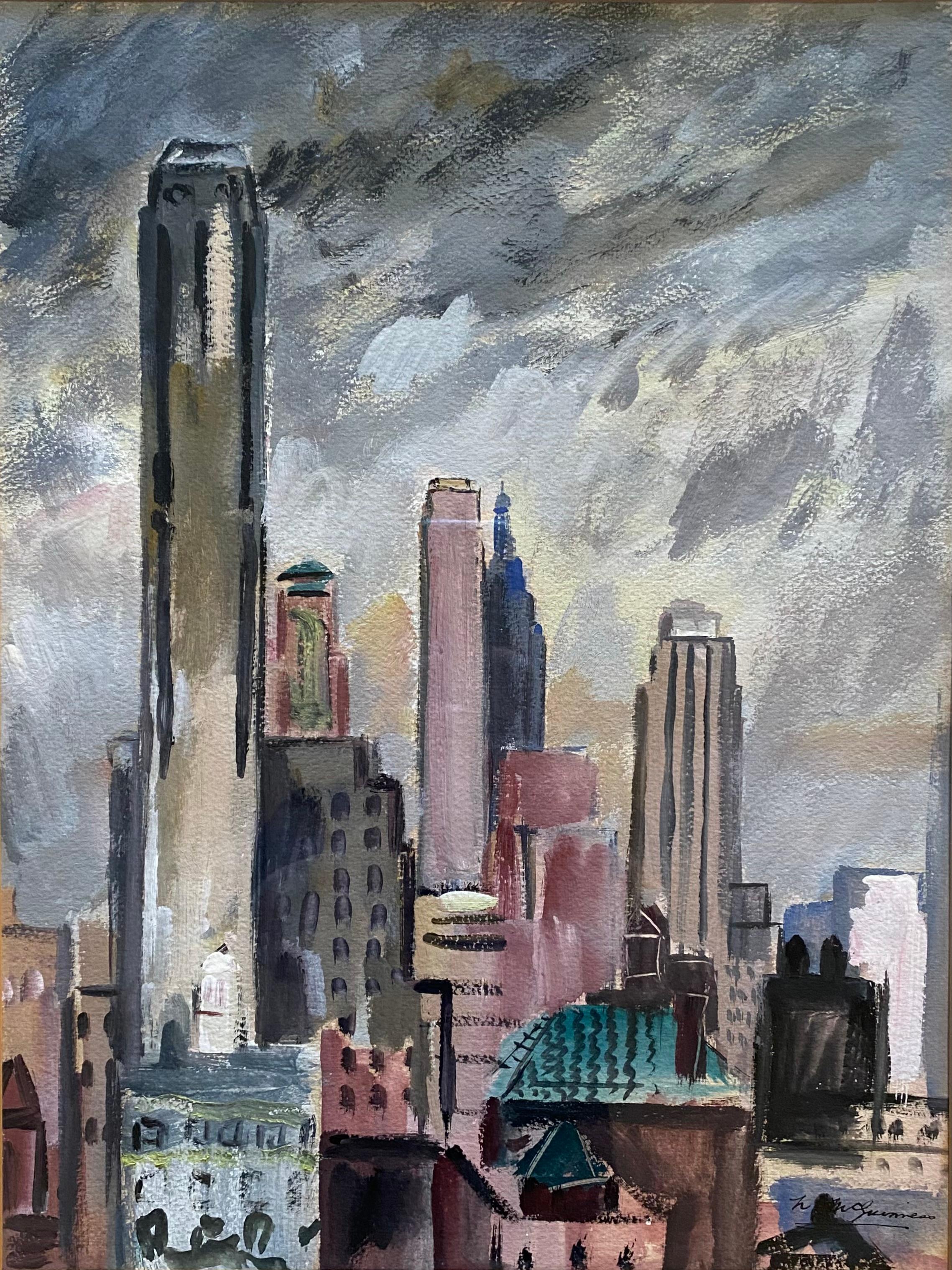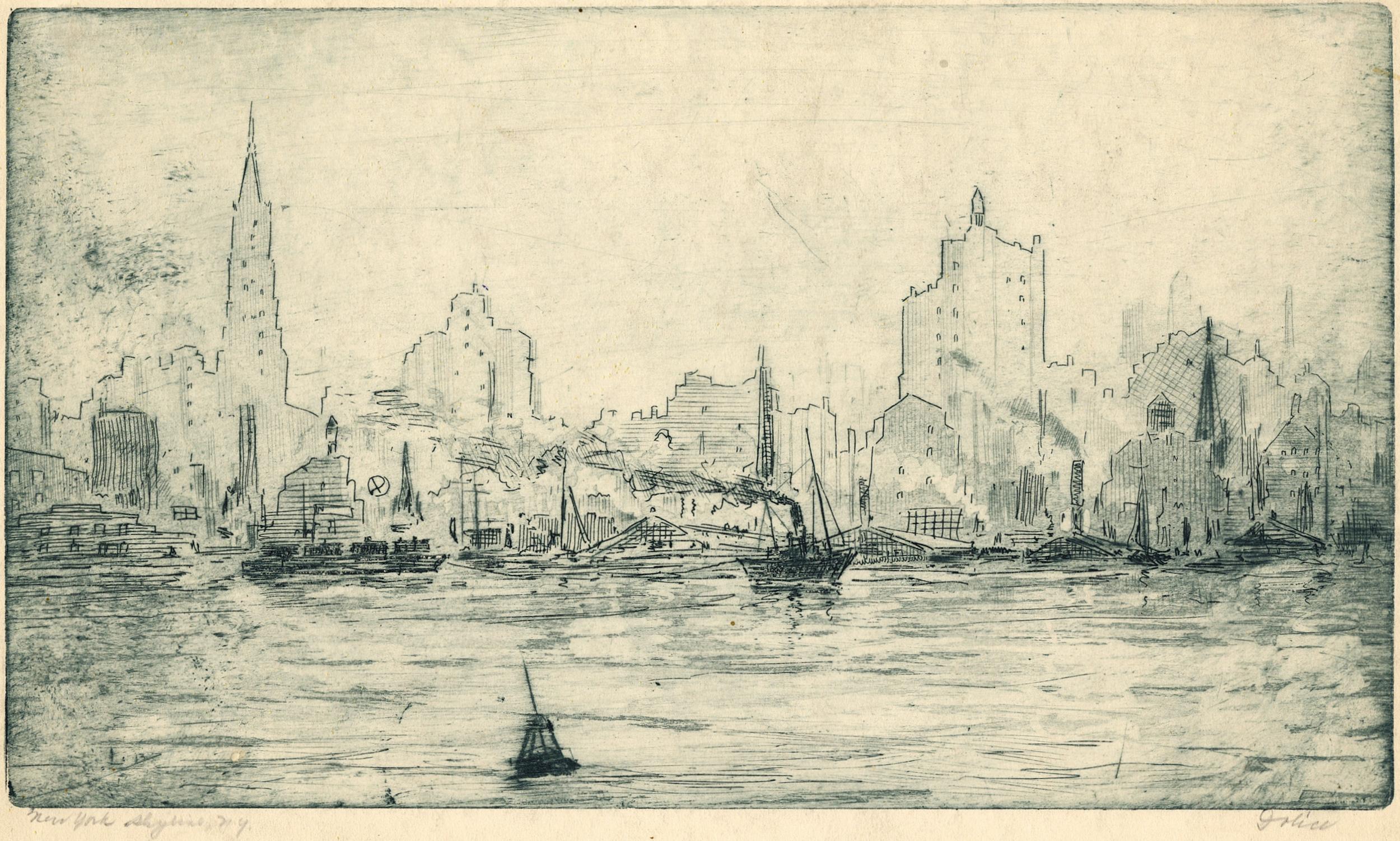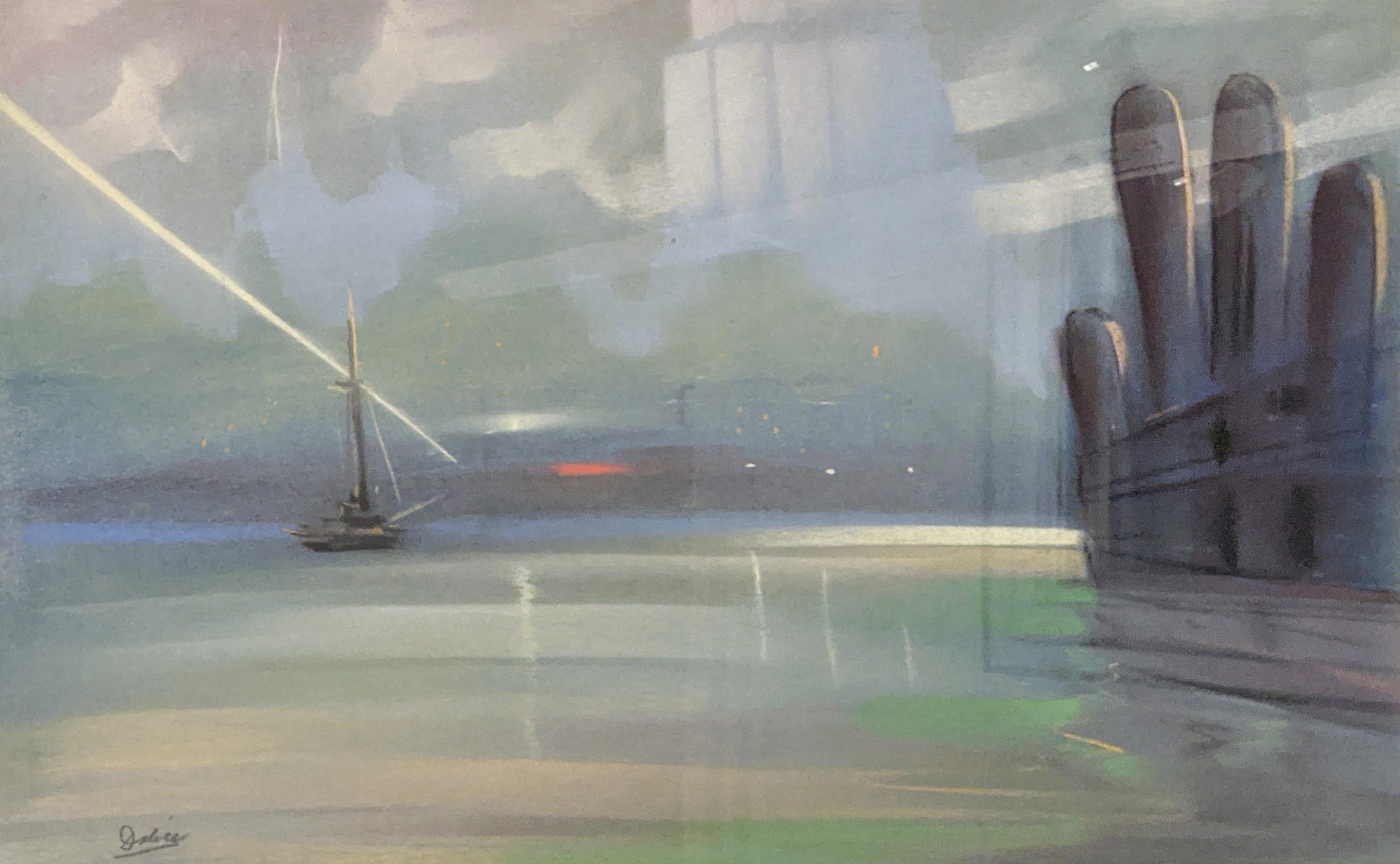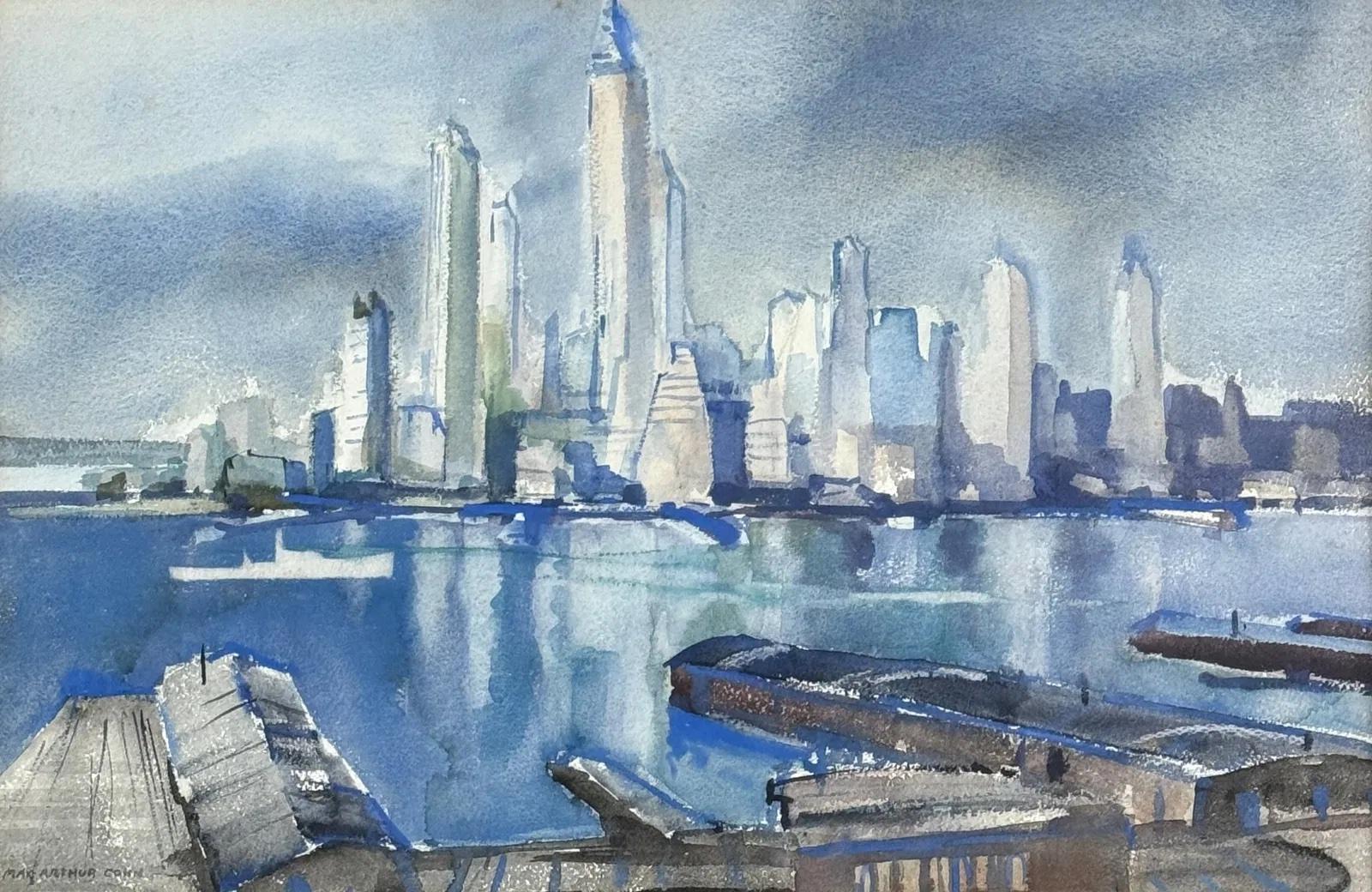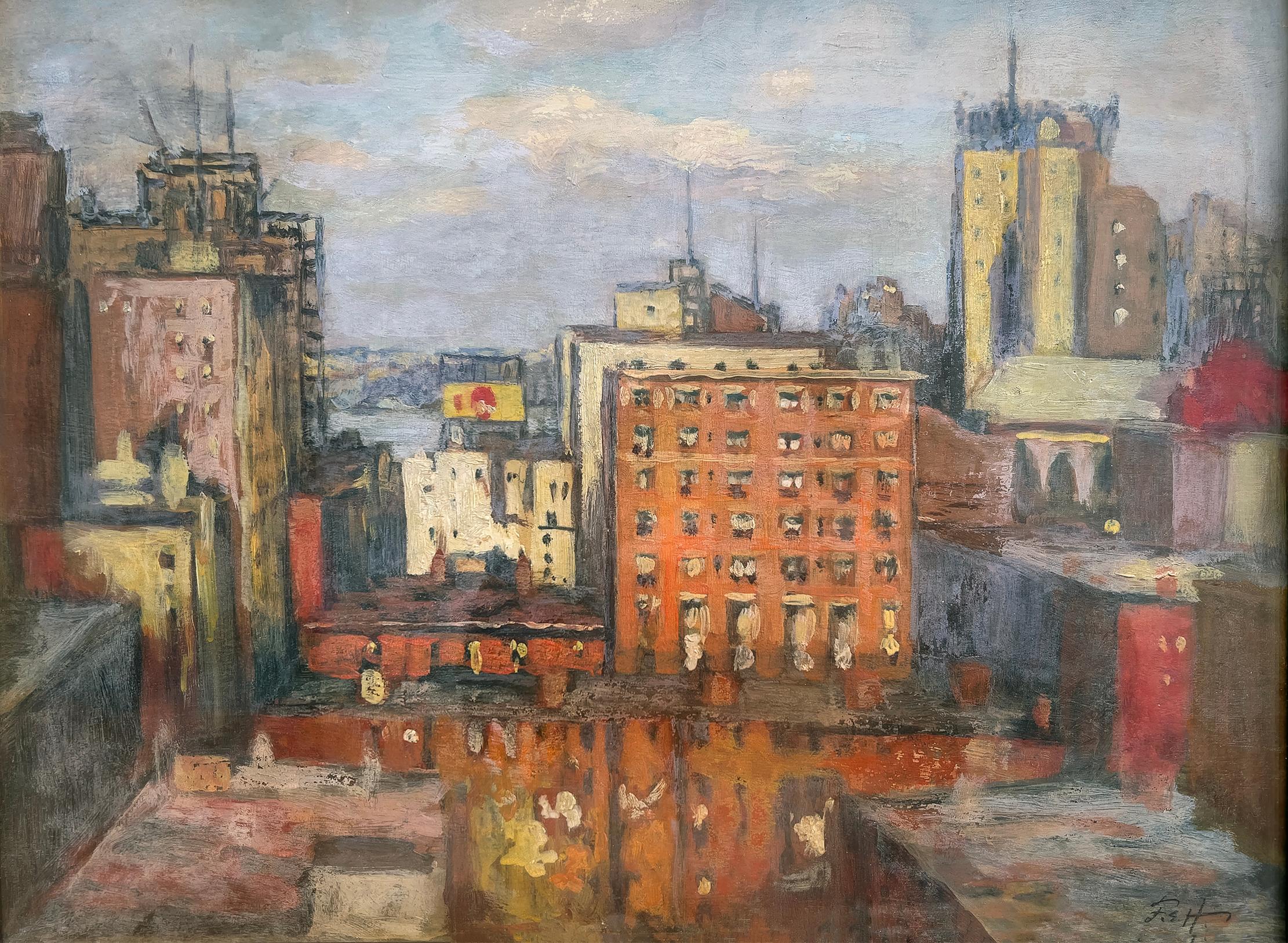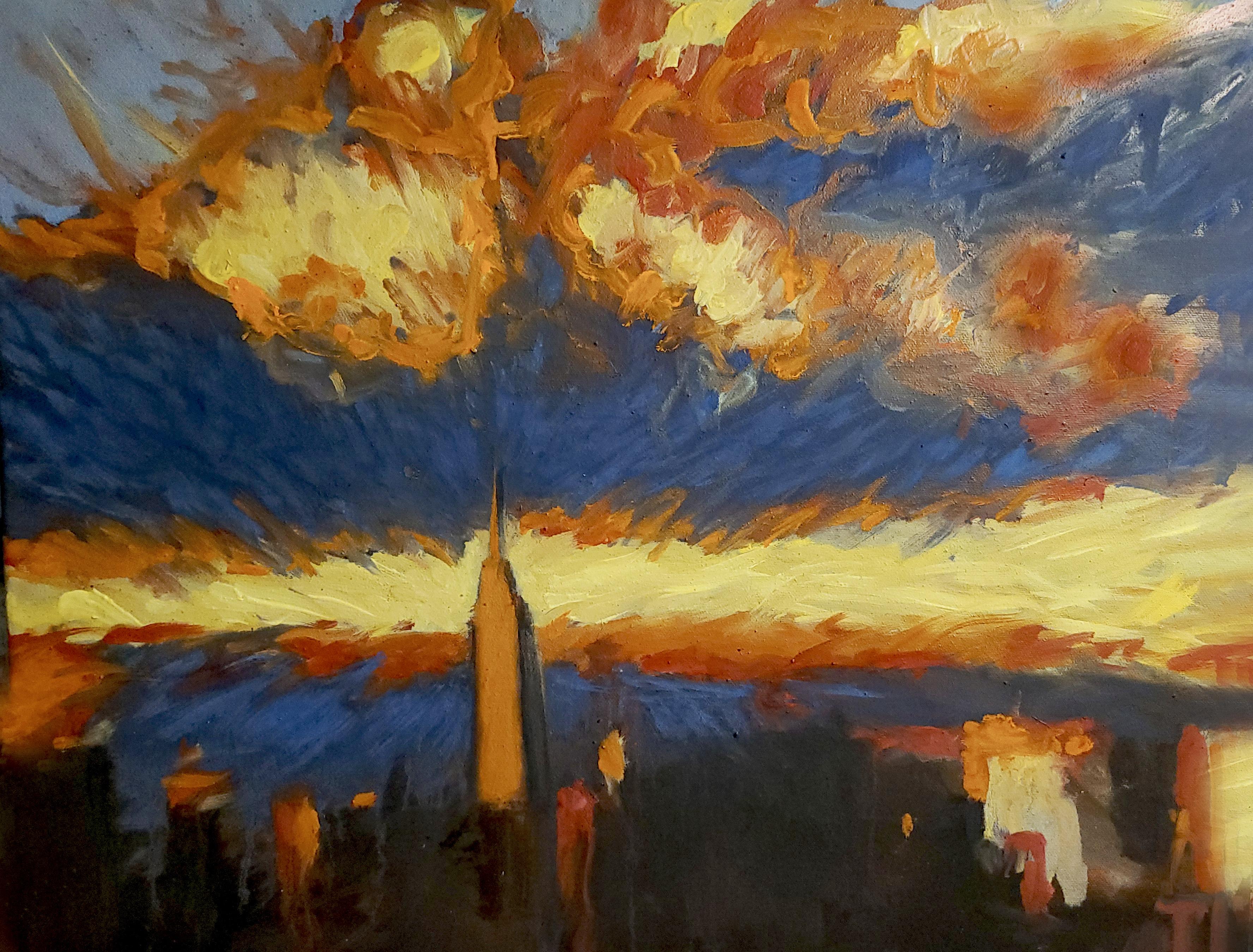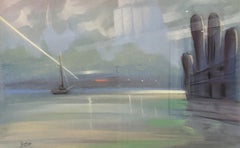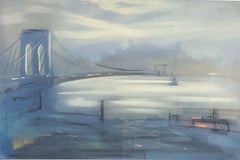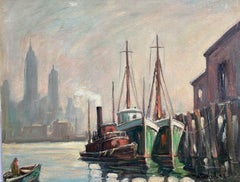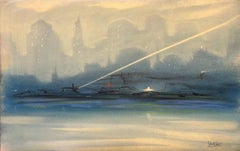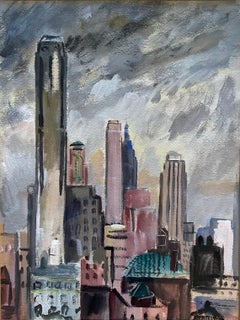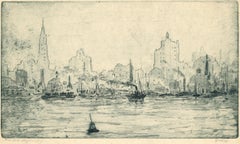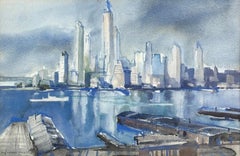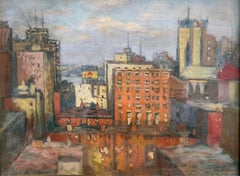Items Similar to "New York City Skyline View from the East River, " Lionel Reiss, Jewish Artist
Want more images or videos?
Request additional images or videos from the seller
1 of 9
Lionel Reiss"New York City Skyline View from the East River, " Lionel Reiss, Jewish Artist
$2,800
$3,50020% Off
£2,140.75
£2,675.9420% Off
€2,465.71
€3,082.1420% Off
CA$3,923.66
CA$4,904.5720% Off
A$4,380.40
A$5,475.4920% Off
CHF 2,295.26
CHF 2,869.0820% Off
MX$53,620.34
MX$67,025.4320% Off
NOK 29,149.84
NOK 36,437.3020% Off
SEK 27,484.60
SEK 34,355.7520% Off
DKK 18,401.85
DKK 23,002.3120% Off
Shipping
Retrieving quote...The 1stDibs Promise:
Authenticity Guarantee,
Money-Back Guarantee,
24-Hour Cancellation
About the Item
Lionel S. Reiss (1894 - 1988)
New York City Skyline View from the East River
Watercolor on paper
13 x 19 inches
Signed lower left
In describing his own style, Lionel Reiss wrote, “By nature, inclination, and training, I have long since recognized the fact that...I belong to the category of those who can only gladly affirm the reality of the world I live in.” Reiss’s subject matter was wide-ranging, including gritty New York scenes, landscapes of bucolic Bucks County, Pennsylvania, and seascapes around Gloucester, Massachusetts. However, it was as a painter of Jewish life—both in Israel and in Europe before World War II—that Reiss excelled. I.B. Singer, the Nobel Prize winner for Literature, noted that Reiss was “essentially an artist of the nineteenth century, and because of this he had the power and the courage to tell visually the story of a people.”
Although Reiss was born in Jaroslaw, Poland, his family immigrated to the United States in 1898 when he was four years old. Reiss's family settled on New York City’s Lower East Side and he lived in the city for most of his life. Reiss attended the Art Students League and then worked as a commercial artist for newspapers and publishers. As art director for Metro-Goldwyn-Mayer, he supposedly created the studio’s famous lion logo.
After World War I, Reiss became fascinated with Jewish life in the ‘Old World.’ In 1921 he left his advertising work and spent the next ten years traveling in Europe, the Middle East, and North Africa. Like noted Jewish photographers Alter Kacyzne and Roman Vishniac, Reiss depicted Jewish life in Poland prior to World War II. He later wrote, “My trip encompassed three main objectives: to make ethnic studies of Jewish types wherever I traveled; to paint and draw Jewish life, as I saw it and felt it, in all aspects; and to round out my work in Israel.”
In Europe, Reiss recorded quotidian scenes in a variety of media and different settings such as Paris, Amsterdam, the Venice ghetto, the Jewish cemetery in Prague, and an array of shops, synagogues, streets, and marketplaces in the Jewish quarters of Warsaw, Lodz, Krakow, Lublin, Vilna, Ternopil, and Kovno. He paid great attention to details of dress, hair, and facial features, and his work became noted for its descriptive quality.
A selection of Reiss’s portraits appeared in 1938 in his book My Models Were Jews. In this book, published on the eve of the Holocaust, Reiss argued that there was “no such thing as a ‘Jewish race’.” Instead, he claimed that the Jewish people were a cultural group with a great deal of diversity within and between Jewish communities around the world. Franz Boas, the founder of modern anthropology, contributed the introduction to the book to support Reiss’s view. Unfortunately, the Nazis thought otherwise and initiated a policy of genocide against the Jewish ‘race’ that ultimately murdered 6 million Jews. After World War II, Reiss wrote, “Doubtless most of my models in Central and Eastern Europe were numbered among the millions of victims. They have haunted me for years.”
Reiss had first observed life in Israel in 1930-31 under the British mandate. In 1952, the Jewish Reconstructionist movement gave Reiss a grant that allowed him to devote six months to traveling through Israel and depicting what he saw. In Israel, he gushed, “there is a lifetime of possibilities in the inexhaustible themes.” In 1954, Reiss published his second book, New Lights and Old Shadows. It contained 210 paintings, watercolors, drawings, and etchings that dealt with “the new lights” of a reborn Israel and the “old shadows” of a European Jewish culture that had been almost wiped out. Reiss reprised the same theme in his last book, A World of Twilight [1972]. He continued painting almost until his death.
Lionel Reiss’s strong Jewish identity and his premonition that European Jewish life itself was in danger of vanishing helped him create a record of that culture. “It was my hope,” he later wrote, “that by pencil and brush I might perpetuate many of the visual aspects of a people whose patterns of life were rapidly changing, and whose memorable landmarks were vanishing.” Thanks to his work, the faces, ghetto architecture, synagogues, and alleyways all remain to remind the viewer of a time and place that no longer exist.
- Creator:Lionel Reiss (1894 - 1986, American, Jewish, Polish)
- Dimensions:Height: 28 in (71.12 cm)Width: 32 in (81.28 cm)
- Medium:
- Movement & Style:
- Period:
- Condition:Excellent.
- Gallery Location:New York, NY
- Reference Number:1stDibs: LU184129905572
About the Seller
5.0
Platinum Seller
Premium sellers with a 4.7+ rating and 24-hour response times
Established in 2022
1stDibs seller since 2022
115 sales on 1stDibs
Typical response time: <1 hour
- ShippingRetrieving quote...Shipping from: New York, NY
- Return Policy
Authenticity Guarantee
In the unlikely event there’s an issue with an item’s authenticity, contact us within 1 year for a full refund. DetailsMoney-Back Guarantee
If your item is not as described, is damaged in transit, or does not arrive, contact us within 7 days for a full refund. Details24-Hour Cancellation
You have a 24-hour grace period in which to reconsider your purchase, with no questions asked.Vetted Professional Sellers
Our world-class sellers must adhere to strict standards for service and quality, maintaining the integrity of our listings.Price-Match Guarantee
If you find that a seller listed the same item for a lower price elsewhere, we’ll match it.Trusted Global Delivery
Our best-in-class carrier network provides specialized shipping options worldwide, including custom delivery.More From This Seller
View All"New York City Harbor" Leon Dolice, Downtown Skyline, East and Hudson River
By Leon Dolice
Located in New York, NY
Leon Dolice (1892 - 1960)
New York Harbor Skyline at Twilight (Searching), circa 1930-40
Pastel on paper
12 x 19 inches
Signed lower left
Provenance:
Spanierman Gallery, New York
The romantic backdrop of Vienna at the turn of the century had a life-long influence upon the young man who was someday to be spoken of as showing promise of becoming "one of the greatest etchers of all time". Leon Dolice, born in Vienna on August 14, 1892, even as a young boy, preferred the lure of painting to the scholastic studies which his early years had expected of him. His father was a machinist, which exposed the boy to welding and metal crafts.
However, his interest in art led him to abandon a secure future in the family business, and he spent most of his late teens and early twenties traveling through the capital cities of Europe studying the works of the Masters.
As with many itinerant artists, he made his way in a variety of fashions metalworker, chef, designer somehow always managing to give vent to his creative instincts. Lured by the adventure of crossing the great Atlantic and by the freedoms of the New World, he came to America in 1920. There he was greeted by the turbulence of New York in the Roaring Twenties. Finding a retreat in the European Bohemianism of Greenwich Village, he picked the streets of this landmark neighborhood as his first subjects.
With the encouragement of new found friends and artists such as George Luks and Herb Roth, he soon ventured out and devoted all his time to chronicling the architecture, back streets, dock scenes and other nostalgia that was fast disappearing from the face of Manhattan, mainly in copperplate etchings. A favorite subject for him was the Third Avenue El near one of his New York City studios on Third Avenue. He won accolades for his work, and although he traveled the East Coast recording landmarks in other cities including Washington DC, Baltimore, Chicago and Philadelphia, he always returned to his new home Manhattan.
A decline in popular favor for etchings led him to put aside his plates in the late 1930's and devote some ten years to pastels, linocuts and painting. His subject matter was almost exclusively New York City street scenes, but figurative works, country scenes and even experiments with Abstract Expressionism at the height of its new found favor in the 1940's punctuated his career.
In 1953, after learning of the forthcoming demise of the Third Avenue El, in the shadow of which he had maintained his studio for over a decade, he once again took to his plates and press and created a final series of Third Avenue and or other New York City landmarks that were then threatened with extinction. His work brings to light aspects of nostalgic New York that survives today only in small part, whether in architecture or in spirit.
Dolice's works are in a number of notable museums and private collections, including the Museum of the City of New York; The New York Public Library Print Collection; The New York Historical Society; Georgetown University Lauinger Library; The Print Club of Philadelphia and others. In the past few years, his work has been exhibited at Hofstra Museum, Long Island, NY; with the Montauk...
Category
1930s American Modern Landscape Drawings and Watercolors
Materials
Paper, Pastel
"New York City Harbor (Brooklyn Bridge), " Leon Dolice, East River, Mid-Century
By Leon Dolice
Located in New York, NY
Leon Dolice (1892 - 1960)
New York Harbor (Brooklyn Bridge), circa 1930-40
Pastel on paper
12 x 19 inches
Signed lower right
Provenance:
Spanierman Gallery, New York
The romantic b...
Category
1930s American Modern Landscape Drawings and Watercolors
Materials
Paper, Pastel
"View from the Docks on the East River, New York" Bela de Tirefort, Cityscape
By Bela de Tirefort
Located in New York, NY
Bela de Tirefort
View from the Docks on the East River, New York, 1958
Signed and dated lower right
Oil on canvas
16 x 20 inches
Bela de Tirefort was born in Eastern Europe, painted...
Category
1950s Modern Landscape Paintings
Materials
Canvas, Oil
"New York Harbor Nocturne" Leon Dolice, Mid-Century New York Nocturnal Landscape
By Leon Dolice
Located in New York, NY
Leon Dolice
New York Harbor Nocturne
Signed lower right
Pastel on paper
12 x 19 inches
The romantic backdrop of Vienna at the turn of the century had a life-long influence upon the...
Category
1930s American Modern Figurative Drawings and Watercolors
Materials
Paper, Pastel
"New York Harbor Nocturne" Leon Dolice, Mid-Century New York Nocturnal Landscape
By Leon Dolice
Located in New York, NY
Leon Dolice
New York Harbor Nocturne, circa 1930-40
Signed lower right
Pastel on paper
12 x 19 inches
The romantic backdrop of Vienna at the turn of the century had a life-long inf...
Category
1930s American Modern Figurative Drawings and Watercolors
Materials
Paper, Pastel
"New York Harbor (Brooklyn Bridge)" Leon Dolice, Mid-Century New York Nocturne
By Leon Dolice
Located in New York, NY
Leon Dolice
New York Harbor (Brooklyn Bridge), circa 1939-1940
Signed lower left
Pastel on paper
12 x 19 inches
Exhibited
Roslyn Harbor, New York, Nassau County Museum of Art, Deco ...
Category
1930s American Modern Figurative Drawings and Watercolors
Materials
Paper, Pastel
You May Also Like
New York Skyline
Located in Los Angeles, CA
The Irish landscape artist, graphic designer and illustrator Nora McGuinness was born in County Derry, Northern Ireland. She studied drawing and fine art painting at the Metropolitan School of Art, Dublin (now the National College of Art & Design), the Chelsea Polytechnic, London, and then (on the advice of Mainie Jellett...
Category
1930s Modern Drawings and Watercolor Paintings
Materials
Gouache
$4,400 Sale Price
20% Off
New York Skyline, NY; East River
By Leon Dolice
Located in Middletown, NY
Etching on medium stock, cream wove paper, 5 15/16 x 10 3/16 inches (151 x 259 mm), full margins. Signed and titled in pencil, lower margin. A fine and detailed impression in dark bl...
Category
1930s American Modern Landscape Prints
Materials
Archival Paper, Etching
NYC Cityscape American Scene Social Realism Mid-Century
By Max Arthur Cohn
Located in New York, NY
NYC Cityscape American Scene Social Realism Mid-Century
Max Arthur Cohn (1903-1998)
New York City Skyline
14 x 21 1/2 inches
Watercolor on paper, c. 1...
Category
1930s American Modern Figurative Drawings and Watercolors
Materials
Paper, Watercolor
New York Skyline the West Side with Hudson River - Vintage New York
By Frank S. Hermann
Located in Miami, FL
Rooftop view of the upper West Side Manhattan as it looked in the 1930s. There is a rough indication of a billboard and a glimpse of the Hudson River. The cluster of buildings depic...
Category
1930s American Impressionist Landscape Paintings
Materials
Oil, Gouache, Board
New York City, view from Brooklyn
By Tom Irizarry Studio
Located in Booklyn, NY
Looking northeast from downtown Brooklyn, Manhattan can be seen at sunset, glowing in saturated red and yellow, here depicted with vermillion and lead-tin orange. Lapis lazuli blue l...
Category
2010s Expressionist Landscape Paintings
Materials
Pigment, Oil
$1,650 Sale Price
44% Off
New York Skyline from Jersey City, Painting, Watercolor on Watercolor Paper
By John Kilduff
Located in Yardley, PA
Painted on location (plein air) from Jersey City overlooking the Hudson River and New York. Painted on two sheets of Arches 140 lb cold pressed watercolor paper. :: Painting :: Impre...
Category
2010s Impressionist Drawings and Watercolor Paintings
Materials
Watercolor
More Ways To Browse
Jewish Artist
Middle East Art
1940 Paintings Of New York City
Jewish Art Framed
Eastern European Artists
City Skyline Art
New York City Skyline
Vintage Lion Drawing
Watercolors North Africa
New York Skyline Painting
Watercolor Painting Gloucester
Jewish Synagogue
Bucks County Pennsylvania
Etching Prague
Gloucester Etching
Reiss Studio
City Street Painting
Painted Wood Sculpture
